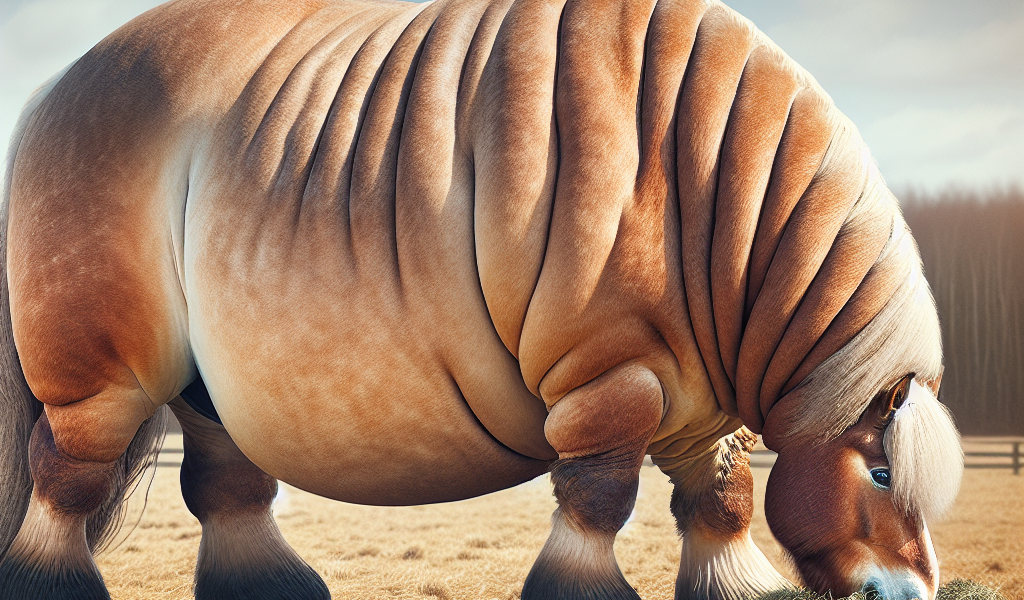Effective Strategies for Weight Loss in Older Horses
With age, horses too can struggle with managing their weight. Your older horse might have put on a few extra pounds and you’re likely wondering how to help them shed that weight in a safe, effective manner. “Effective Strategies for Weight Loss in Older Horses” is an article that focuses on how to handle weight loss in older horses and provides proven, practical techniques to promote healthier weight levels. Whether the goal is achieving a fast, quick weight loss or ensuring a steady, gradual reduction, this article presents tailored solutions to meet your horse’s specific needs.
Understanding the Importance of Weight Management in Older Horses
It’s important to understand that weight management in older horses is vital for their overall health and wellbeing. Just like with humans, age-related physiological changes can cause horses to gain weight, leading to potential health issues if left unchecked.
Physiological Changes in Aged Horses
As horses get older, they experience several physiological changes. These include a decrease in metabolic rates, dental issues, and changes in digestive efficiency. Understanding these changes can help you better manage your horse’s weight and keep them healthy as they age.
Potential Health Risks Associated with Obesity
Just as in humans, overweight or obese horses can face several health risks. These range from the development of insulin resistance and equine metabolic syndrome to joint problems, breathing difficulty, and an increased susceptibility to laminitis. It’s vital, therefore, to manage your horse’s weight to prevent these conditions from developing.
Recognizing Overweight or Obese Horses
Recognizing if your horse is overweight or obese is the first step toward better weight management. Several methods can help determine the fitness level of your horse, including visual evaluation, a clinical assessment, and understanding the significance of fat distribution.
Visual Evaluation of the Horse’s Body Condition
By simply examining your horse from a few angles, you can gain a good understanding of their weight status. Overweight horses may have visible deposits of fat, particularly along the neck, tail, and shoulder areas.
Clinical Assessment and Body Condition Scoring
For a more precise evaluation, the body condition scoring (BCS) system can be used. Vets score the horse’s body condition from 1 to 9, with 1 indicating extreme thinness and 9 signifying extreme obesity. A score from 4 to 6 is generally considered healthy for most horses.
Significance of Fat Distribution in Older Horses
Typically, fat distribution in older horses tends to occur around the neck, tail head, and over the ribs. An abnormal fat distribution pattern may imply that your horse is suffering from a metabolic disorder, which will require a veterinarian’s intervention for its management.

Factors Contributing to Weight Gain in Older Horses
Weight gain in older horses can be attributed to several factors. Understanding and addressing these can aid in effective weight management.
Declining Metabolic Rates
As mentioned earlier, metabolic rates decline as horses age. This directly impacts how efficiently horses burn calories, leading to more weight gained from consumption of the same amount of food.
Reduction in Physical Activities
Due to a decrease in mobility and physical strength, older horses tend to be less active. This lack of activity can contribute to weight gain.
Feeding and Nutritional Practices
Lastly, a horse’s diet and feeding practices play a significant role. If a horse is fed energy-dense feeds, combined with a sedentary lifestyle, it can easily become overweight.
Changing Feeding Practices for Weight Loss
Changing your horse’s feeding practices is a significant factor in achieving and maintaining healthy weight.
Controlling Feed Portion Sizes
Start by controlling the size of feed portions to ensure your horse is receiving enough nutrients without consuming excess calories.
Balancing Diet with Nutrient-Rich Food
Feeding your horse a balanced, nutrient-rich diet will ensure they receive the required nutrition without excess caloric intake.
Feeding Frequency Changes
Changing the frequency of feeding can also help. Smaller, more frequent meals allow for better digestion and satiety control.
Choosing Low-Sugar and Low-Starch Diets
It’s best to opt for feeds low in sugar and starch to prevent blood sugar spikes and the risk of developing insulin resistance, which can potentially lead to weight gain.

Implementing a Safe Exercise Regime
Coupled with diet modification, a safe and consistent exercise regime can help keep your horse from gaining extra weight.
Understanding the Horse’s Fitness Level
Before starting any kind of exercise program, understanding the existing fitness level of your horse is crucial. Overworking an unfit horse can lead to injuries and other health problems.
Creating a Gradual Exercise Plan
Starting with light exercises and gradually increasing intensity is the safest way to get your horse back in shape without causing harm.
Importance of Regular Physical Activities
Just like humans, horses need regular, moderate physical activity to stay healthy and maintain a healthy weight.
Integrating Veterinarian-Assisted Weight Loss
A vet can provide personalised guidance based on your horse’s specific needs, which is crucial in the weight management process.
Consulting a Veterinarian for Tailored Diet Plans
Involving your vet in the weight management process can be beneficial. Based on your horse’s current body condition, age, and health status, they can help design a personalised, nutritionally balanced diet.
Routine Health Assessments
Regular health assessments should be a part of your horse’s weight management plan. They not only allow for monitoring of bodily functions and changes in weight, but also help identify potential health issues early on.
Monitoring Progress and Making Adjustments
A vet’s perspective can be beneficial for monitoring the progress of your horse’s weight management plan and making necessary adjustments.

Importance of Dental Care in Weight Management
A horse’s dental health can significantly affect its ability to chew and digest food effectively, playing a role in weight management.
Impact of Dental Health on Digestion
Without proper oral care, horses may develop dental issues that can impair their ability to properly chew and digest food, possibly leading to weight loss or gain.
Arranging Regular Dental Examinations
Regular dental exams by a professional can help identify and fix dental issues early on, ensuring that your horse maintains good eating habits.
Addressing Dental Issues for Improved Eating Habits
Proper attention to dental health helps horses chew their food more effectively, allowing for better digestion and nutrient absorption.
Managing Health Conditions Contributing to Weight Gain
Some health conditions, such as Cushing’s disease or insulin resistance, can cause unintended weight gain in horses. Veterinarian supervised care is often necessary to manage these.
Understanding Common Equine Diseases Resulting in Weight Gain
It’s crucial to understand and identify if your horse is suffering from a disease that may be contributing to weight gain.
Medical Treatment and Therapies
In some cases, medication or special therapies may be necessary to control weight gain due to health conditions.
Veterinarian Supervised Care and Monitoring
Routine vet visits and consistent care can help monitor any changes and manage these conditions more effectively.
Psychological Aspects of Weight Loss in Horses
The psychological wellbeing of horses can impact their dietary habits and overall health.
Dealing with Horse Behavioral Changes
Changes in feeding routine and exercise may cause behavioural changes in horses. Recognising and coping with these changes is an essential part of weight management.
Recognizing Stress or Anxiety
Stress or anxiety can impact a horse’s eating habits. Noticing these signs and creating a peaceful environment can ensure your horse maintains a healthy feeding pattern.
Maintaining a Peaceful and Comfortable Environment
A good environment has a positive impact on the horse’s stress levels, feeding habits, and overall wellbeing.
Maintaining Long-term Weight Control in Older Horses
Achieving a healthy weight is only half the battle – maintaining it is the long-term goal.
Regular Monitoring and Reassessment
Routine monitoring and reassessment of the horse’s weight and overall health condition can help catch any early signs of weight gain.
Establishing a Consistent Feeding and Exercise Routine
Consistency is crucial when it comes to feeding and exercise. A fixed regime in these areas plays a crucial role in maintaining a healthy weight.
Engaging Support of Trainers and Veterinarians
Lastly, don’t underestimate the value of professional help in your journey. Trainers and veterinarians can provide expert guidance and support throughout the weight management process.

